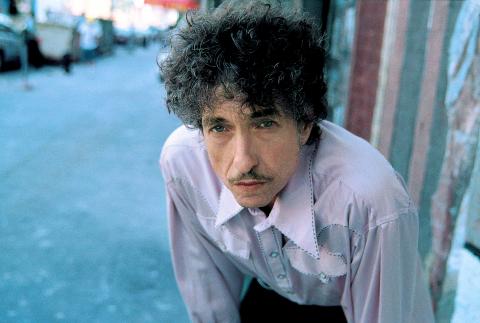He’s finally coming to Taiwan. Bob Dylan is scheduled to perform at the Taipei Arena (台北小巨蛋) on April 3.
Tickets go on sale at noon on Monday, according to the show’s promoter, Very Aspect Culture Group (有象文化), and will be available through books.com.tw and at all 7-Eleven ibon kiosks.
Rumors of a Dylan concert in Taiwan surfaced in 2005, when the American music icon and folk legend was supposedly considering an invitation by the former Taipei County Government (now the New Taipei City Government) to perform at the annual Ho Hai Yan Rock Festival (海洋音樂祭). Needless to say, it didn’t happen.

Photo Courtesy of Very Aspect Culture Group
Then last year was supposed to be Dylan’s debut appearance in Taiwan, as part of an Asian tour with dates in Beijing, Shanghai and Hong Kong.
But Dylan canceled the tour after China’s government denied him permission to perform there. The international media picked up on the story, with many outlets speculating that China’s Ministry of Culture was still reeling after Icelandic pop singer Bjork’s controversial 2008 concert in Shanghai, in which she shouted “Tibet! Tibet!” during her song Declare Independence.
After his Taipei concert, Dylan is scheduled to perform in Beijing, Shanghai and Hong Kong, according to the fan site boblinks.com, which is a nonofficial but well-established source for concert news and information on the singer.
And hopefully for fans, Chinese authorities will realize they have little to worry about with the 69-year-old rocker, who has long moved on from his folk-protest days and rarely engages in banter with the audience.
Not that his shows are lacking. Dylan, who plays an average of 100 concerts a year, is known for often recasting both old and new material with fresh arrangements, and for his top-notch backing band.
Taipei is the start of Dylan’s tour in Asia, which also includes shows in Vietnam, Singapore and Australia throughout April.

The primaries for this year’s nine-in-one local elections in November began early in this election cycle, starting last autumn. The local press has been full of tales of intrigue, betrayal, infighting and drama going back to the summer of 2024. This is not widely covered in the English-language press, and the nine-in-one elections are not well understood. The nine-in-one elections refer to the nine levels of local governments that go to the ballot, from the neighborhood and village borough chief level on up to the city mayor and county commissioner level. The main focus is on the 22 special municipality

The People’s Republic of China (PRC) invaded Vietnam in 1979, following a year of increasingly tense relations between the two states. Beijing viewed Vietnam’s close relations with Soviet Russia as a threat. One of the pretexts it used was the alleged mistreatment of the ethnic Chinese in Vietnam. Tension between the ethnic Chinese and governments in Vietnam had been ongoing for decades. The French used to play off the Vietnamese against the Chinese as a divide-and-rule strategy. The Saigon government in 1956 compelled all Vietnam-born Chinese to adopt Vietnamese citizenship. It also banned them from 11 trades they had previously

In the 2010s, the Communist Party of China (CCP) began cracking down on Christian churches. Media reports said at the time that various versions of Protestant Christianity were likely the fastest growing religions in the People’s Republic of China (PRC). The crackdown was part of a campaign that in turn was part of a larger movement to bring religion under party control. For the Protestant churches, “the government’s aim has been to force all churches into the state-controlled organization,” according to a 2023 article in Christianity Today. That piece was centered on Wang Yi (王怡), the fiery, charismatic pastor of the

Hsu Pu-liao (許不了) never lived to see the premiere of his most successful film, The Clown and the Swan (小丑與天鵝, 1985). The movie, which starred Hsu, the “Taiwanese Charlie Chaplin,” outgrossed Jackie Chan’s Heart of Dragon (龍的心), earning NT$9.2 million at the local box office. Forty years after its premiere, the film has become the Taiwan Film and Audiovisual Institute’s (TFAI) 100th restoration. “It is the only one of Hsu’s films whose original negative survived,” says director Kevin Chu (朱延平), one of Taiwan’s most commercially successful